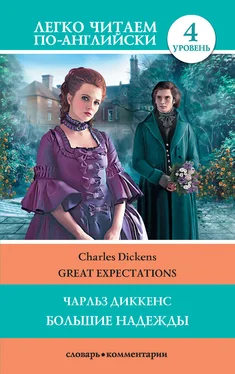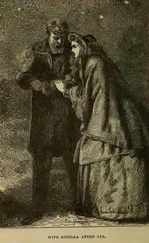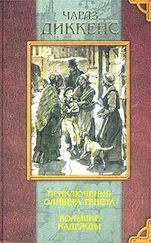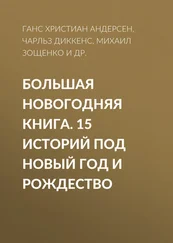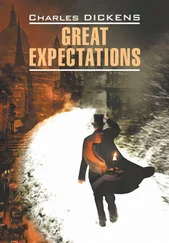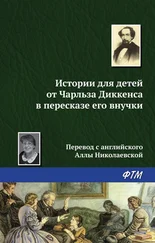“What!” said Miss Havisham, flashing her eyes upon her, “are you tired of me?”
“Only a little tired of myself,” replied Estella, disengaging her arm, and moving to the great chimney-piece, where she stood looking down at the fire.
“Speak the truth!” cried Miss Havisham, passionately striking her stick upon the floor; “you are tired of me.”
Estella looked at her with perfect composure, and again looked down at the fire. Her graceful figure and her beautiful face expressed a self-possessed indifference.
“You cold, cold heart!” exclaimed Miss Havisham.
“What?” said Estella; “do you reproach me for being cold? You?”
“Are you not?” was the fierce retort.
“You should know,” said Estella. “I am what you have made me. [188]Take all the praise, take all the blame; take all the success, take all the failure; in short, take me.”
“O, look at her, look at her!” cried Miss Havisham, bitterly; “Look at her so hard and thankless! [189]”
“What would you have?” said Estella, “You have been very good to me, and I owe everything to you. What would you have?”
“Love,” replied the other.
“You have it.”
“I have not,” said Miss Havisham.
“Mother by adoption,” retorted Estella, “mother by adoption, I have said that I owe everything to you. All I possess is freely yours. Beyond that, I have nothing. And if you ask me to give you, what you never gave me, my gratitude and duty cannot do impossibilities.”
“Did I never give her love!” cried Miss Havisham, turning wildly to me. “Let her call me mad, let her call me mad!”
“Why should I call you mad,” returned Estella.
“So proud, so proud!” moaned Miss Havisham, pushing away her gray hair with both her hands.
“Who taught me to be proud?” returned Estella. “Who praised me when I learnt my lesson?”
“So hard, so hard!” moaned Miss Havisham.
“Who taught me to be hard?” returned Estella. “Who praised me when I learnt my lesson?”
“But to be proud and hard to me!” Miss Havisham quite shrieked, as she stretched out her arms. “Estella, Estella, Estella, to be proud and hard to me!”
Estella looked at her for a moment with a kind of calm wonder.
“I cannot think,” said Estella, raising her eyes after a silence “why you should be so unreasonable when I come to see you after a separation.”
It was with a depressed heart that I walked in the night.
It is impossible to turn this leaf of my life, without putting Bentley Drummle’s name upon it.
On a certain occasion when the Finches were assembled, Drummle toasted a lady. [190]What was my indignant surprise when he called upon the company to pledge him to “Estella!”
“Estella who?” said I.
“Never you mind,” retorted Drummle.
“Estella of where?” said I.
“Of Richmond, gentlemen,” said Drummle, “and a beauty.”
“I know that lady,” said Herbert, across the table, when the toast had been honored.
“Do you?” said Drummle.
“And so do I,” I added, with a scarlet face.
“Do you?” said Drummle. “O, Lord!”
It was easy for me to find out, and I did soon find out, that Drummle had begun to follow her closely, [191]and that she allowed him to do it.
At a certain Ball at Richmond I asked her, “Are you tired, Estella?”
“Rather, Pip.”
“You should be.”
“Estella, it makes me wretched that you should encourage a man so generally despised as Drummle. You know he is despised.”
“Well?” said she.
“You know he is a deficient, ill-tempered, lowering, stupid fellow.”
“Well?” said she; and each time she said it, she opened her lovely eyes the wider.
I was three-and-twenty years of age. Nothing had I heard to enlighten me on the subject of my expectations. We had left Barnard’s Inn more than a year, and lived in the Temple. Our chambers were in Garden-court, [192]down by the river.
Business had taken Herbert on a journey to Marseilles. [193]I was alone, and had a dull sense of being alone. Dispirited and anxious, I sadly missed the cheerful face and ready response of my friend.
It was wretched weather; stormy and wet, stormy and wet; and mud, mud, mud, deep in all the streets.
I read with my watch upon the table, purposing to close my book at eleven o’clock. As I shut it, all the many church-clocks in the City – some leading, some accompanying, some following – struck that hour. Suddenly I heard the footstep stumble in coming on.
“There is some one down there, is there not?” I called out, looking down.
“Yes,” said a voice from the darkness beneath.
“What floor do you want?”
“The top. Mr. Pip.”
“That is my name. What’s the matter?”
“Nothing the matter,” returned the voice. And the man came on. In the instant, I had seen a smiling face that was strange to me. The man looked as a voyager by sea. He had long gray hair. His age was about sixty. He was a muscular man, strong on his legs.
“Pray what is your business?” I asked him.
“My business?” he repeated, pausing. “Ah! Yes. I will explain my business.”
“Do you wish to come in?”
“Yes,” he replied; “I wish to come in, master.”
He looked about him with the strangest air – an air of wondering pleasure.
“What do you want?” said I, half suspecting him to be mad.
He stopped in his looking at me, and slowly rubbed his right hand over his head. He sat down on a chair that stood before the fire, and covered his forehead with his large brown hands. I looked at him attentively then, and recoiled a little from him; but I did not know him.
“I’m glad you’ve grown up,” said he, shaking his head.
I knew him! Even yet I could not recall a single feature, but I knew him! It was my convict. He grasped my hands heartily, raised them to his lips, kissed them, and still held them.
“You acted noble, [194]my boy,” said he. “Noble, Pip! And I have never forgot it!”
“Oh!” said I. “If you are grateful to me for what I did when I was a little child… If you have come here to thank me, it was not necessary. I am glad to believe you have repented and recovered yourself. I am glad to tell you so. I am glad that, thinking I deserve to be thanked, you have come to thank me. But our ways are different ways. You are wet, and you look weary. Will you drink something before you go?”
“I think,” he answered with the end at his mouth, “that I will drink (I thank you) before I go.”
There was a tray ready on a side-table. I brought it to the table near the fire, and asked him what he would have? He touched one of the bottles without looking at it or speaking, and I made him some hot rum and water.
“How are you living?” I asked him.
“I’ve been a sheep-farmer, stock-breeder, other trades besides, away in the new world,” said he; “many a thousand mile of stormy water off from this.”
“I hope you have done well? [195]”
“I’ve done wonderfully well. I’m famous for it.”
“I am glad to hear it.”
“I hope to hear you say so, my dear boy.”
“May I ask you,” he said then, with a smile that was like a frown, and with a frown that was like a smile, “how you have done well, since you and me were out on them lone shivering marshes?”
“How?”
“Ah!”
He emptied his glass, got up, and stood at the side of the fire, with his heavy brown hand on the mantel-shelf. I answered that I had got some property.
“Might I ask what property?” said he.
I faltered, “I don’t know.”
“Might I ask whose property?” said he.
Читать дальше
Конец ознакомительного отрывка
Купить книгу
